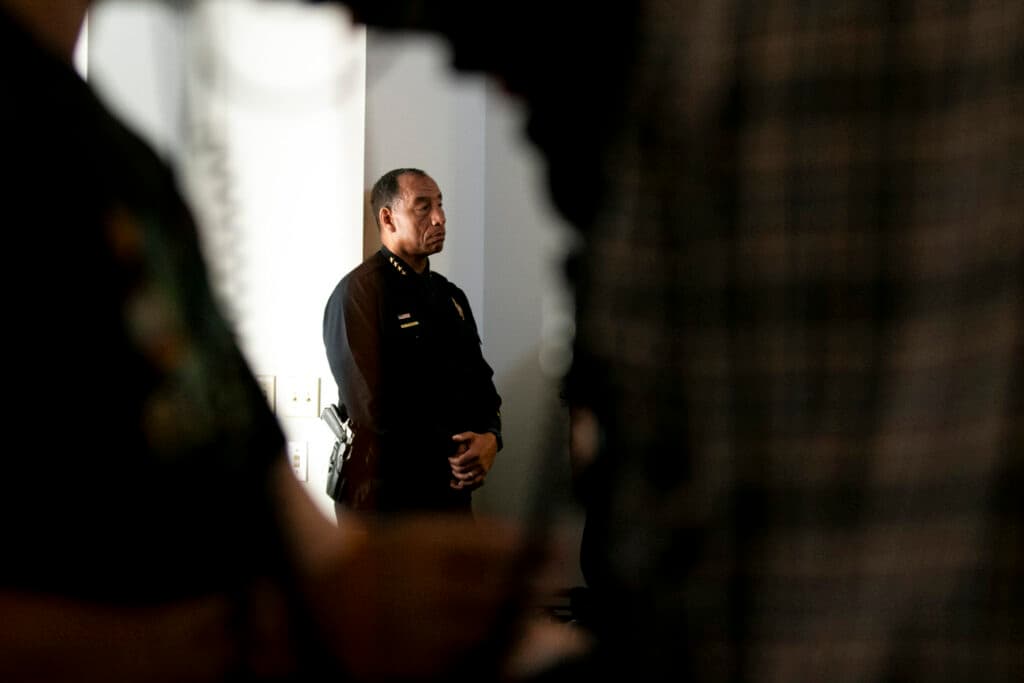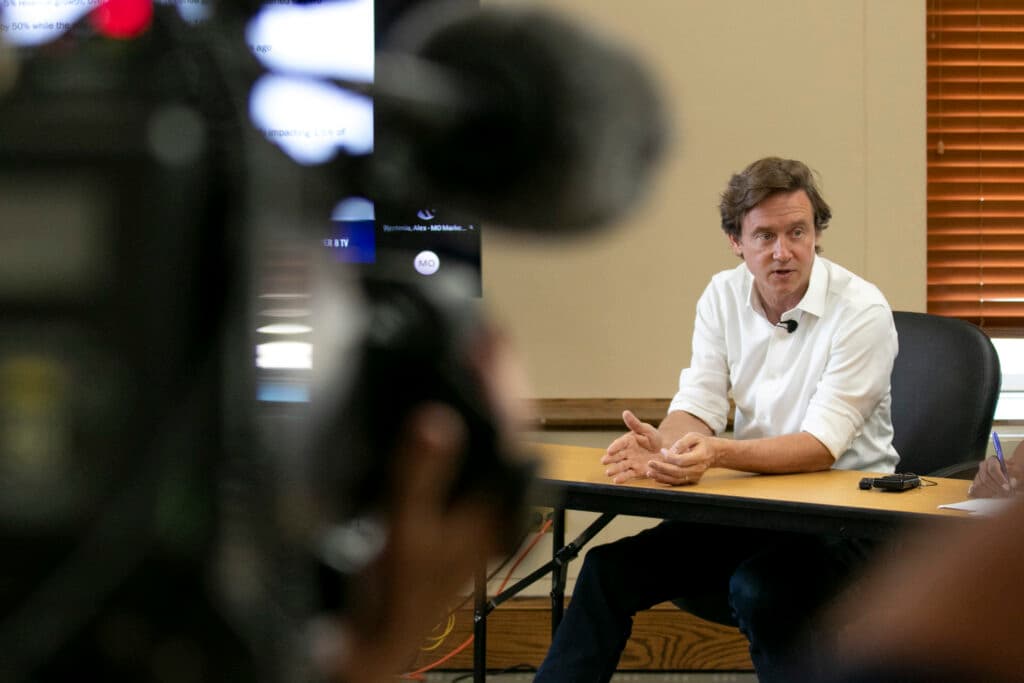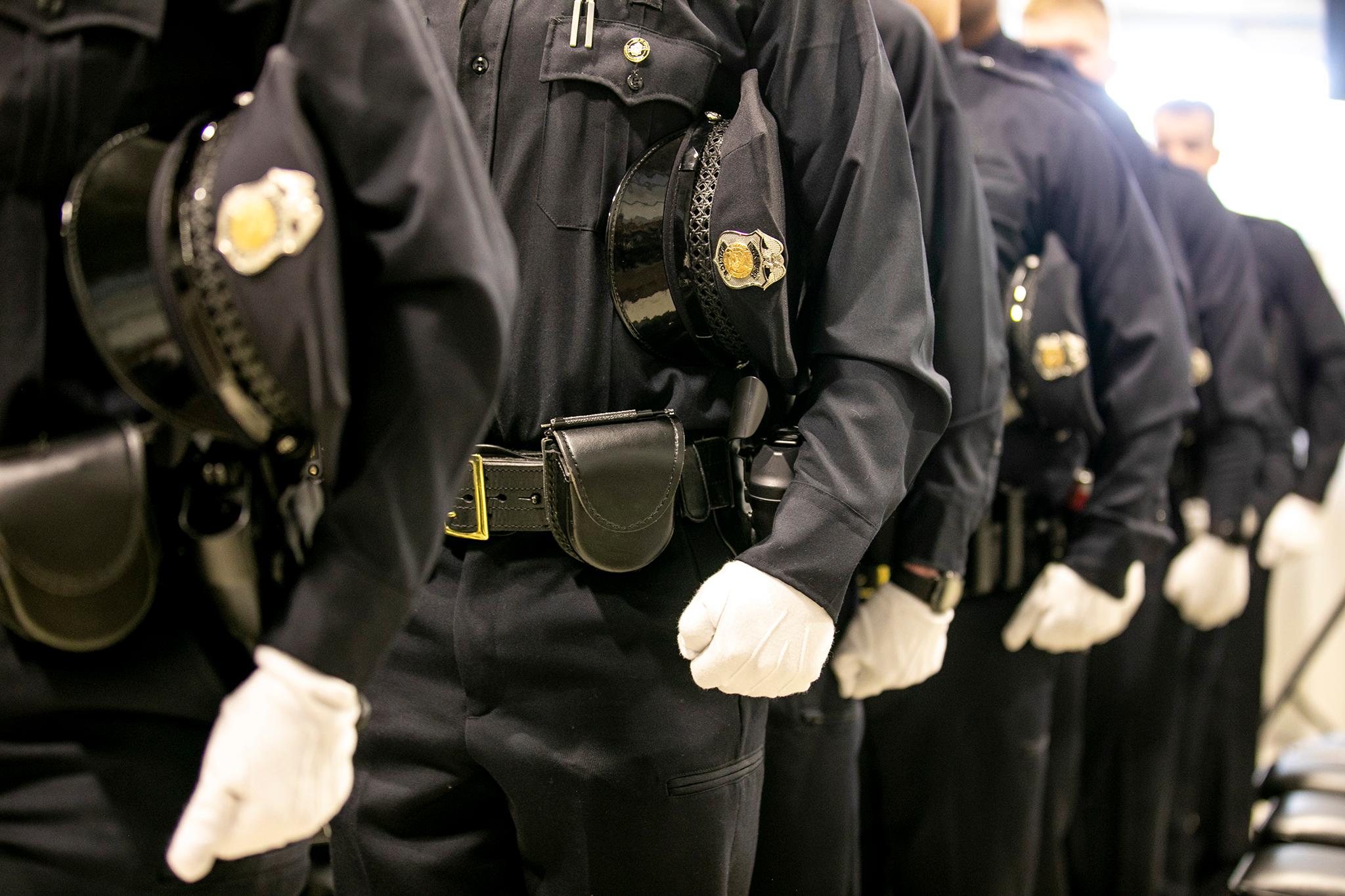Mayor Mike Johnston is on a campaign to reduce spending in swaths of the city. One group that won’t be defunded: police officers.
After laying off 171 non-union workers and slashing hundreds of vacant jobs to close a $250 million budget gap, Johnston is on track to raise salaries for union police officers. The city also approved raises for firefighters recently.
In a recent interview, the mayor said spending on public safety was a top priority, arguing that the city couldn’t cut back on benefits and spending just as it was resolving police staffing issues.
“Every neighborhood I go to, no matter how progressive or conservative they are, they'll say, ‘Why don't we have more officers on the street? Why don't I see them?’” Johnston told Denverite.
“So that's a very clear request from our residents that we're going to deliver,” he continued. “But we think that a core part of the city's success is going to be public safety, so we're not stepping back from that.”
If the raises are approved, police officers will receive:
- a 5 percent increase spread across 2026
- a 6 percent increase spread across 2027
- a 4 percent increase in 2028.
Currently, rank-and-file police officers top out around $110,000, while lieutenants can earn $151,000.
The move drew criticism from police reform advocates.
“It’s unacceptable, but unfortunately not surprising,” said Robert Davis, with the community-based Denver Task Force to Reimagine Policing and Public Safety. “While the rest of the city faces layoffs and the elimination of vital services, police are receiving raises. Police are city employees like everyone else, and they should share in the sacrifices of budget cuts instead of being shielded from them.”
The city’s public safety agencies — the Denver Police Department, the Sheriff Department and the Denver Fire Department — saw some of the smallest cuts in the recent layoffs, though they are among the largest agencies in the general fund.
The city also protected uniformed public safety employees, along with 911 operators, from furloughs.
The police department lost 10 vacant positions, all for administrative and technical employees, representing about 1 percent of its budgeted staff. Other, smaller agencies — such as the climate office — lost dozens of positions.
The city spends nearly a quarter of its budget on public safety, a total of more than $643 million. Of that, more than $272 million went to police.
Just how much the city’s overall public safety funding will grow or shrink will not be known until Johnston publishes his draft 2026 budget this month.
What else is in the contract?
City Council’s Health and Safety Committee recently approved the raises without discussion or debate, sending the contract on to the full Denver City Council.
Under the proposal, officers would also be able to:
- Donate sick leave to another officer’s sick-leave bank
- Celebrate Indigenous Peoples' Day as a recognized holiday
- Bank 10 saved holidays
- Bank more time off, with the limit increased from 80 hours to 120 hours
Additionally, new recruits would get $1,500 to offset the purchase of a uniform and firearm.
In total, police officers would get a pay increase of more than 15 percent by 2028. It’s somewhat more than what police received in the last contract, covering 2023 to 2025, when police received a steady 4 percent raise per year.
Separately, Denver’s firefighters’ union also won raises for the coming years: 5 percent in 2026 and another 5 percent in 2027.
For comparison, city workers in general were eligible for up to 4 percent merit raises in 2025. Whether workers will see raises in 2026 is still unknown.

A contrast from previous downturns
In the past, some of Denver's mayors have frozen police salaries or deferred raises in the face of fiscal crises. Mayor Michael Hancock skipped police raises in 2021, at the height of the pandemic, and gave officers a modest 2.7 percent raise in 2022.
In 2009, contending with the Great Recession, Mayor John Hickenlooper played hardball with the police union, asking them to defer raises or face layoffs. They chose deferred raises.
"In the present situation, we're going to have a reduction in the size of the force if there's not some sort of change or we can't come up with some sort of compromise," Hickenlooper said, as The Denver Post reported at the time.
But Johnston says his tough-on-crime approach is working. The city’s top goals, he said, are reducing crime and homelessness and increasing affordability. A city poll obtained by Denverite found that homelessness and crime and safety were the top two concerns for local voters, while issues like traffic, downtown revitalization and the environment were at the bottom of the list.
The mayor’s office points to a drop in homicides as evidence that his crime-prevention policy is working.
From the middle of 2024 to the middle of 2025, homicides dropped by 45 percent – the largest reduction in the 42 cities tracked in the Council on Criminal Justice’s mid-year Crime Trends in U.S. Cities report.
“We’re not going to change the strategy we’re using there,” Johnston said. “We’re going to double down on deepening that strategy.”
And that means spending more on armed law enforcement.

The trend is national, said Davis, of the “Reimagine Policing” group.
“We’ve seen that this type of austerity—cutting community programs, health resources, and neighborhood services while expanding policing — creates the very conditions that drive insecurity and crime.
He points to New York and Chicago, where he said cuts in social services and increases in police budgets coincided with higher neighborhood instability, deeper inequality and long-term public safety challenges.
“Denver risks repeating those mistakes if we don’t prioritize investment in communities, prevention, and healing rather than funneling money into raises for policing while everyone else is asked to do more with less,” he said.
More spending questions loom
The Johnston administration is still drafting its proposed city budget for 2026, which it will release this month. The budget, which must be approved by Denver City Council, will determine whether agencies like the police department see their funding grow or shrink next year.
It’s unclear whether Johnston will grow spending for other safety programs, such as medical and mental health responders, public health interventions, and other programming.
Meanwhile, hundreds of other vacant positions were eliminated — including some therapists in the jail, public health outreach case coordinators, library security guards, park rangers and a youth counselor.
The cuts came months before city workers will gain collective bargaining rights on Jan. 1. Multiple unions are already in the process of organizing city employees, though contracts likely couldn’t come into effect until 2027. Police and firefighters have already had union rights for many years.












